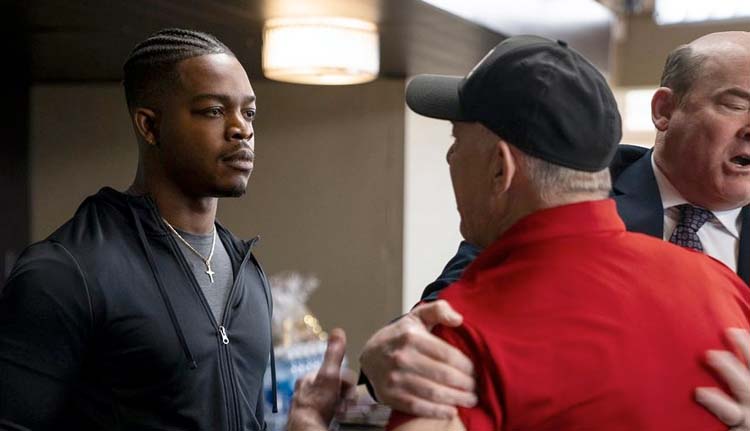National Champions is a new film from Ric Roman Waugh (Greenland) about the complex relationship between top-tier colleges and the student-athletes who put their health on the line to generate billions of dollars.
Coach James Lazor, played by JK Simmons (Whiplash, Spider-Man: No Way Home), has come close to a national championship several times but never held the trophy. However, things are looking bright this season with his superstar, Heisman-winning QB LeMarcus James (Stephan James). The team prepares to play for the national championship. However, LeMarcus makes a bold decision to strike against the NCAA and not play in the championship game. Now seventy hours before the game, many players on both teams have joined James’ protest.
PopAxiom spoke with Gabriel Fleming about becoming a filmmaker and editing National Champions, a “hotel drama” as a “thriller.”
That’s The Job
Gabriel’s connection to making visual art “… started with a video camera when I was 12 years old. I worked as a busboy at a local restaurant so that I could save up to buy a VHS camera; this was 1985.”
“One of the new features on the camera,” he continues, “was a flying erase head so you could do clean edits. It was very new; the first consumer-friendly form of editing. I was messing around with that as a kid.”
Gabriel attended film school, where he initially focused on “writing and directing,” he says. Then, “I got into the French New Wave and documentary-style art films. Finally, I made a couple of micro-budget feature films.”
“I do remember that when I thought about feature films, I saw cuts in it.” Gabriel’s editor brain was in full effect. “As a director, I didn’t think about just the story or lines or performance, I was more interested in visualizing how one shot connects to the next and how that would combine with the music and sound to build emotion.”
Gabriel kept creating and realized that the visual way he put together movies was “just the way my brain worked.”
“It is all about the montages and how one element juxtaposes the next to create a feeling or an idea,” he adds. “ Editing is the unique art of cinema. All the other elements are borrowed from theatre and photography, and fashion. Editing you can do only in a film. That’s always appealed to me.”
Of course, understanding editing and committing to the act of editing are two different things. “I was an editor on America’s Top Model for a couple of seasons. I had an assistant who got his first chance to edit. He was editing a couple of scenes, and he came out and said to me one day, ‘How do you watch it over and over again?’ I said, ‘That’s the job.’” Your brain has to be wired that way.”

About National Champions
National Champions director Ric Roman Waugh and Gabriel worked together on two previous films, “Angel Has Fallen and Greenland, which were action films.”
COVID happened, and the film industry had to shift gears in the way things were produced. “This film came up for Rick. It’s something that can be shot during COVID because it takes place almost entirely in hotel rooms. So, the cast and crew could be easily quarantined.”
Having actors safe in hotel rooms is great, but how do you make an exciting film in these locations? “One of the things Rick said early on was, ’this isn’t just a drama in hotel rooms, this is a thriller.’ So we want to treat it with that in mind.”
“Also, treat it as a football game, yet there’s no football in the film,” Gabe shares. “We want to think of it as ‘this side has scored a point and they’re up, then this side scored and is in the lead.’ We want to keep the thriller tension in that back and forth in what could’ve been a plain, beige wall hotel room movie. We wanted to keep the audience on the edge of their seats.”
Gabriel compares National Champions to a previous project with Rick. “You can feel a little bit of a similarity between National Champions and Greenland, which is a movie about the end of the world,” Gabriel laughs. “There are some stylistic similarities with pacing and music approach.”

Pacing & Process
Every film has a pace, a rhythm or a tempo that reveals the plot. “Pacing is so subjective. In my process, I start with the first pass of a scene. I try to pace it as reasonably fast as I think I can. Then come back to it later and discover, ‘Oh, this is way too slow’ then pace it up.”
“Eventually, I like to go through the whole movie and pace it as fast as it allows,” he continues. Finding the “right” place for a film is part of the puzzle for editors and filmmakers. “Then I go back, and sort of loosen a bunch of pockets. So you get an ebb and flow instead of this monotonous type of pacing.”
National Champions has long scenes of drama and tension. “The second to last scene, which is a 12-minute long scene, was one that we tried pacing it up, and it was just breaking it. It was ruining the scene.”
“In the end,” he explains, “we ended up pacing it down from my original editor’s cut. Slowing it down in certain pockets was surprising to me. This movie was a discovery in pacing for me because of the mix of thriller and drama.”
The mix of a thriller’s fast pace and a drama’s slow one was a balance that Gabe sought to find. “That’s the art of editing, that personal taste of how something flows and moves and guiding the emotions of the audience.”
Working with JK
JK Simmons is one of the principal characters in this riveting, poignant story. “JK is such a pro,” he says about editing scenes of the legendary actor. “He delivers an amazing performance in every single take. But, of course, that can present its own challenges. You’re always trying to find not the best take, but what is the most appropriate performance for this moment.”
Gabe recalls the first day of shooting. “There’s a scene where JK gives a speech to a whole team, and we see what he can do. It’s the very first day of shooting, and he’s got this 5-page monologue essentially. He did probably about 15 takes. He’d do something a little different in each one. One might be stern, then threatening; the next, he’s more vulnerable. Finally, there’s one take where he’s crying through most of it.”
“That was about finding each mode of his performance and intermixing the different emotional places that he was in in a way that created a shape to the scene,” he explains. “I could dip in and out of the vulnerability for a few lines, and the threatening lines intercut with the faces of these players who are real college players.”
As an editor, “It’s just a pleasure to work with someone like JK and get these subtle variations.”
Wrapping Up
What filmmakers does Gabe love to watch? “These days, any Denis Villeneuve film I’m excited to see. Watching Dune was mind-blowing. I’m a huge David Lynch fan. I listen to his weather report every morning in LA. But, I do like some obscure international filmmakers like Apichatpong Weerasethakul (Memoria).”
“I always say to my agent ‘Star Wars,’” he shares. “If there’s a Star Wars project available, I’ll do it. Star Wars and Star Trek were really important in my childhood. I’d love to be involved with that.”
Is National Champions on your watch list?
Thanks to Gabriel Fleming and Backlight PR
for making this interview possible.
Discover more interviews from Ruben R. Diaz right here!


